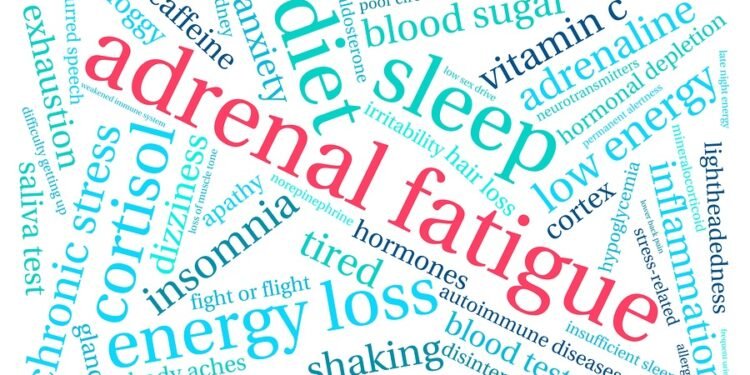Adrenal fatigue sometimes resembles chronic stress and lifestyle pressure. Normally, the patients are usually left chronically exhausted with the feeling of mental fog and physical drain.
Recoveries for such patients are normally facilitated through the combination of other lifestyle adjustments, dietary changes, and other kinds of stress management, but they are equally dependent on exercise.
Let’s see, in this article, how exercise could be incorporated into the recovery cycle of Adrenal Fatigue Treatment and various exercises that help recovery. Also, the best safety practice when integrating exercise into one’s regimen.
What is Adrenal Fatigue Treatment?
Adrenal fatigue is a condition of total physical, mental, and emotional exhaustion often due to the passage of time due to stress and irregular lifestyle habits.
Although it has not been widely accepted as a medical diagnosis, adrenal fatigue is a state relating to the body’s adrenal glands. These glands produce hormones, such as cortisol, that are in charge of stress and energy.
Long exposure of the body to stress will cause the adrenal glands to work harder to produce a higher level of cortisol in the body, which might be imbalanced sometime in the future.
The condition can then cause fatigue, irritability, sleep disorders, and a severely weakened immune system. Treatment for adrenal fatigue varies, but the ultimate goal is to restore balance in the adrenal glands and improve one’s body’s capacity for coping with stress.
Traditional therapies included altering diet, practicing techniques to reduce stress, improving sleep, and a more judiciously planned exercise program.
How Different Exercises Help in Adrenal Fatigue Therapy?
Exercises of different categories contribute uniquely to the treatment process of adrenal fatigue and provide varied benefits to address the physical and mental levels during recovery. So, here’s how different forms of exercise may help in terms of adrenal function as well as overall health:
Yoga and Stretching

Yoga and stretching are some of the most useful exercises for fighting adrenal fatigue practices. In particular, yoga was known to activate the parasympathetic response of the body; one could just say that this was the “rest and digest” response.
The parasympathetic response works against the effects that could potentially cause chronic stress to activate the adrenal glands. Gentle postures, including deep breaths and meditation, help relax the person and ground the mind and body.
Hatha and restorative yoga styles are good for alertness without straining the body. Stretching can also release tension from the muscles, which might bring about relaxation and increase flexibility.
Strength Training
Strength training done in moderation can level out blood sugar and build muscle tone. Individuals with adrenal fatigue may occasionally even find that resistance exercises, including body-weight exercises or even lightweight lifting, are helpful in moderation.
Moderated movements with appropriate rest between sets will reduce the stress on the adrenal glands, although strength-building will still be achieved.
Low to moderate weight training does not cause such spikes of cortisol as high-intensity exercise but builds up both physical and mental resilience over time.
Mind-Body Exercises: Tai Chi and Qi Gong
Mind-body exercises such as Tai Chi and Qi Gong involve slow movements that are performed in rhythm with the breathing, triggering a meditative state that would help relax and restore balance within.
Such ancient practices are very useful to an adrenal fatigue sufferer; they do indeed help reduce stress without physical exertion.
Tai Chi and Qi Gong help improve concentration; they ensure that energy levels are well balanced, that they are focused and attentive, and that they require minimal body exertion.
They are indeed highly effective in improving circulation, thus enhancing nutrition delivery and stress removal.
Light Aerobics
It doesn’t have to be that hard to add just a bit more aerobic exercise if gentle aerobics in the form of water-based activities or light dance courses can invigorate without taxing. These exercises stimulate the production of feel-good hormones without being too taxing.
Water activities are especially ideal for people recovering from fatigue-related diseases because water’s natural buoyancy reduces stress on the joints and muscles.
Guidelines for Addition of Exercise During the Treatment Protocol for Adrenal Fatigue
When the treatment has taken place, it is equally important to maintain proper lifestyle changes and treatments to avoid relapse, and thereby to boost energy levels. Here are the guidelines to follow:
Listen to Your Body
The recovery from adrenal fatigue demands a vigilant awareness of your body. You need to learn how to pay attention to it.
Notice increases in fatigue and irritability as signs that you’re overdoing it. Gradual Progress: Do activities low in intensity and then gradually increase the duration or frequency once you start to recover.
Rest and Recovery come first
Adrenal recovery is facilitated with a proper balance between rest and activities. A succession of several workout days is not advisable, and a sufficient number of rest days should also be allowed to prevent overloading of the adrenal glands.
Alternation of workout days with low-activity stretching or relaxation allows for recovery after the treatment. Alternation prevents stagnation but allows sufficient time to totally recover from treatment.
Breathe Properly
Some breathing exercises complement a physical routine in regulating cortisol, which increases relaxation. Examples include diaphragmatic breathing, or “belly breathing,” and are simple but effective methods that enhance the flow of oxygen and reactions to stress.
Routines involving breathing exercises both before and after exercises would indeed be very soothing to the body, getting it ready for physical activities and then relaxing it later.
Morning Exercises
Exercise timing may also be responsible for adrenal recovery. Most physicians recommend to patients with adrenal fatigue exercising in the morning when cortisol levels peak.
Its levels, however, fall at night. Morning low-intensity exercise can influence the appropriate cadence of the cortisol rhythms, enhance steady energy during the day and quality rest at night.
Hydrate and Eat
Rehydration and nutrient replacement are the bases of replenishment with energy, particularly for recovery from adrenal fatigue. Nutritionally, high-energy sources during exercise and in recovery should be protein and complex carbohydrates and healthy fats.
Adequate hydration also ensures that the electrolytes of the body are maintained at normal physiological levels and minimizes instances of adrenal stress.
Conclusion
Exercises also play an important role in the recovery from adrenal fatigue, because exercises could improve energy levels and control the response to stress.
Gentle, restorative exercises might be combined with intensity escalation to enable building resilience and sustainable long-term adrenal health.












